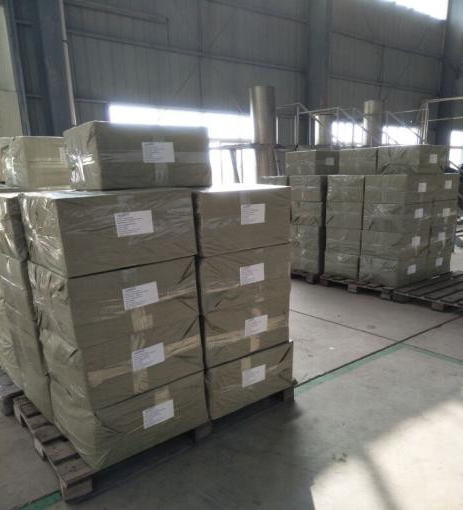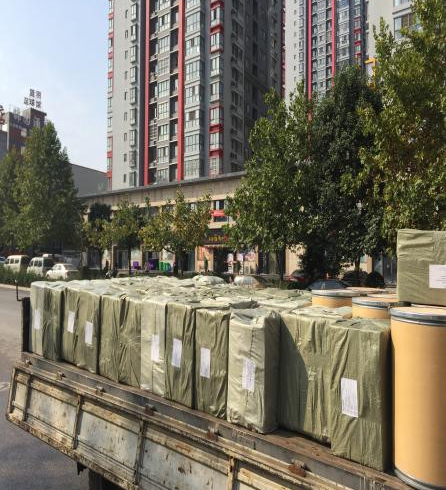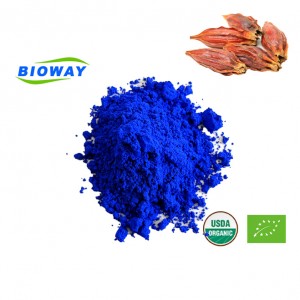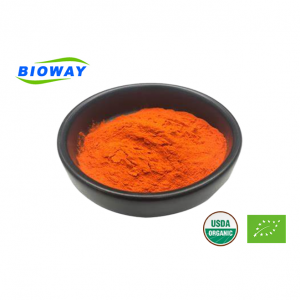Premium Gardenia Jasminoides Extract Powder
Gardenia jasminoides extract powder is a natural substance derived from the Gardenia jasminoides plant, with the common names of Cape jasmine, and Gardenia. It contains several active ingredients, including Gardoside, Shanzhiside, Rotundic acid, Geniposidic acid, Crocin II, Crocin I, Scoparone, Genipin-1-b-D-gentiobioside, Genipin, and Geniposide.
These active ingredients have various potential health benefits, including antioxidant, anti-inflammatory, and potential anti-cancer properties. Gardenia jasminoides extract powder is often used in traditional medicine and herbal supplements for its potential medicinal properties. It may also be used in skincare and cosmetic products for its antioxidant and anti-inflammatory effects.
| Main Active Ingredients in Chinese | English Name | CAS No. | Molecular Weight | Molecular Formula |
| 栀子新苷 | Gardoside | 54835-76-6 | 374.34 | C16H22O10 |
| 三栀子甙甲酯 | Shanzhiside | 29836-27-9 | 392.36 | C16H24O11 |
| 铁冬青酸 | Rotundic acid | 20137-37-5 | 488.7 | C30H48O5 |
| 京尼平苷酸 | Geniposidic acid | 27741-01-1 | 374.34 | C16H22O10 |
| 西红花苷-2 | Crocin II | 55750-84-0 | 814.82 | C38H54O19 |
| 西红花苷 | Crocin I | 42553-65-1 | 976.96 | C44H64O24 |
| 滨蒿内酯 | Scoparone | 120-08-1 | 206.19 | C11H10O4 |
| 京尼平龙胆双糖苷 | Genipin-1-b-D-gentiobioside | 29307-60-6 | 550.51 | C23H34O15 |
| 京尼平 | Genipin | 6902-77-8 | 226.23 | C11H14O5 |
| 京尼平甙 | Geniposide | 24512-63-8 | 388.37 | C17H24O10 |
Gardenia jasminoides extract powder has several product features that make it desirable for various applications. These features include:
1. Natural origin: Derived from the Gardenia jasminoides plant, the extract powder is a natural ingredient, which may appeal to consumers seeking natural and plant-based products.
2. Aromatic properties: Gardenia jasminoides extract powder has a pleasant and distinctive aroma, making it suitable for use in perfumes, scented candles, and other fragranced products.
3. Colorant: The extract powder contains compounds such as Crocin I and Crocin II, which contribute to its vibrant yellow color. This makes it suitable for use as a natural colorant in food, beverages, and cosmetic products.
4. Antioxidant properties: The presence of various active ingredients such as Geniposide and Genipin suggests potential antioxidant properties, which can be beneficial for product formulations targeting oxidative stress and free radical damage.
5. Flavoring agent: The extract powder may be used as a natural flavoring agent in food and beverage products, adding a unique and pleasant taste profile.
6. Stability: The compounds present in Gardenia jasminoides extract powder may contribute to the stability and shelf life of products, making it a desirable ingredient for various formulations.
7. Compatibility: The extract powder may be compatible with a wide range of product formulations, including skincare, haircare, and food products, due to its diverse chemical composition.
Gardenia jasminoides extract powder has several potential health benefits, including:
1. Anti-inflammatory properties: The extract may help reduce inflammation in the body, which can be beneficial for conditions such as arthritis and other inflammatory diseases.
2. Antioxidant effects: Gardenia jasminoides extract is rich in antioxidants, which can help protect the body from oxidative stress and damage caused by free radicals.
3. Liver protection: Some studies suggest that the extract may have hepatoprotective effects, helping to support liver health and function.
4. Anti-anxiety and stress relief: Gardenia jasminoides extract has been traditionally used in Chinese medicine to help reduce anxiety and stress, and may have calming effects on the nervous system.
5. Skin health: The extract may have potential benefits for skin health, including anti-aging effects and the ability to help reduce inflammation and irritation.
6. Weight management: Some research indicates that Gardenia jasminoides extract may have potential effects on weight management and metabolism, making it a potential aid for weight loss and maintenance.
7. Digestive support: The extract may have digestive benefits, including potential effects on gut health and digestion.
Here are the potential applications for each active ingredient found in Gardenia jasminoides extract:
1. Gardoside: Gardoside has been studied for its potential anti-inflammatory, antioxidant, and hepatoprotective properties. It may have applications in the development of natural anti-inflammatory and antioxidant products, as well as in liver health supplements.
2. Shanzhiside: Shanzhiside has been researched for its potential neuroprotective effects and its ability to support cognitive function. It may have applications in the development of supplements or products aimed at supporting brain health and cognitive function.
3. Rotundic acid: Rotundic acid has been investigated for its potential anti-inflammatory and antioxidant properties. It may have applications in the development of natural anti-inflammatory and antioxidant products.
4. Geniposidic acid: Geniposidic acid has been studied for its potential anti-inflammatory, antioxidant, and hepatoprotective effects. It may have applications in the development of natural anti-inflammatory and antioxidant products, as well as in liver health supplements.
5. Crocin II and Crocin I: Crocin II and Crocin I are carotenoid compounds with potential antioxidant and anti-inflammatory properties. They may have applications in the development of skincare products, as well as in supplements aimed at reducing inflammation and oxidative stress.
6. Scoparone: Scoparone has been researched for its potential anti-inflammatory and antioxidant effects. It may have applications in the development of natural anti-inflammatory and antioxidant products.
7. Genipin-1-b-D-gentiobioside and Genipin: Genipin and its derivatives have been studied for their potential applications in drug delivery systems, as well as in the development of natural products with anti-inflammatory and antioxidant properties.
Storage: Keep in a cool, dry, and clean place, Protect from moisture and direct light.
Bulk Package: 25kg/drum.
Lead Time: 7 days after your order.
Shelf Life: 2 years.
Remark: Customized specifications also can be achieved.

25kg/case

Reinforced packaging

Logistics security
Express
Under 100kg, 3-5Days
Door to door service easy to pick up the goods
By Sea
Over300kg, Around 30 Days
Port to port service professional clearance broker needed
By Air
100kg-1000kg, 5-7Days
Airport to airport service professional clearance broker needed

Bioway gains certifications such as USDA and EU organic certificates, BRC certificates, ISO certificates, HALAL certificates, and KOSHER certificates.

Gardenia jasminoides and jasmine are two distinct plants with different characteristics and uses:
Gardenia jasminoides:
Gardenia jasminoides, also known as Cape jasmine, is a flowering plant native to East Asia, including China.
It is valued for its fragrant white flowers and is often cultivated for ornamental purposes and traditional medicinal uses.
The plant is known for its use in traditional Chinese medicine, where its fruit and flowers are used to prepare herbal remedies.
Jasmine:
Jasmine, on the other hand, refers to a group of plants from the genus Jasminum, which includes a variety of species such as Jasminum officinale (common jasmine) and Jasminum sambac (Arabian jasmine).
Jasmine plants are known for their highly fragrant flowers, which are often used in perfumery, aromatherapy, and tea production.
Jasmine essential oil, extracted from flowers, is widely used in the fragrance industry and for its therapeutic properties.
In summary, while both Gardenia jasminoides and jasmine are prized for their aromatic qualities, they are distinct plant species with different botanical characteristics and traditional uses.
The medicinal properties of Gardenia jasminoides are diverse and have been recognized in traditional medicine for centuries. Some of the key medicinal properties associated with Gardenia jasminoides include:
Anti-Inflammatory Effects: Compounds found in Gardenia jasminoides have been studied for their potential anti-inflammatory properties, which may be beneficial in managing inflammatory conditions and related symptoms.
Antioxidant Activity: Gardenia jasminoides contains bioactive compounds that exhibit antioxidant effects, helping to combat oxidative stress and protect cells from damage caused by free radicals.
Liver Protection: Traditional medicinal uses of Gardenia jasminoides include its potential to support liver health and function. It is believed to have hepatoprotective properties, aiding in the protection and regeneration of liver cells.
Calming and Sedative Effects: In traditional Chinese medicine, Gardenia jasminoides is often used for its calming and sedative properties, which may help in managing stress, and anxiety, and promoting relaxation.
Digestive Support: Some traditional uses of Gardenia jasminoides involve its potential to support digestive health, including alleviating symptoms such as indigestion and promoting healthy digestion.
Antimicrobial and Antiviral Properties: Compounds derived from Gardenia jasminoides have been investigated for their potential antimicrobial and antiviral activities, suggesting possible benefits in combating certain infections.
It’s important to note that while Gardenia jasminoides has a long history of traditional medicinal use, further scientific research is ongoing to fully understand and validate its medicinal properties. As with any herbal remedy, it’s advisable to consult with a healthcare professional before using Gardenia jasminoides for medicinal purposes.













